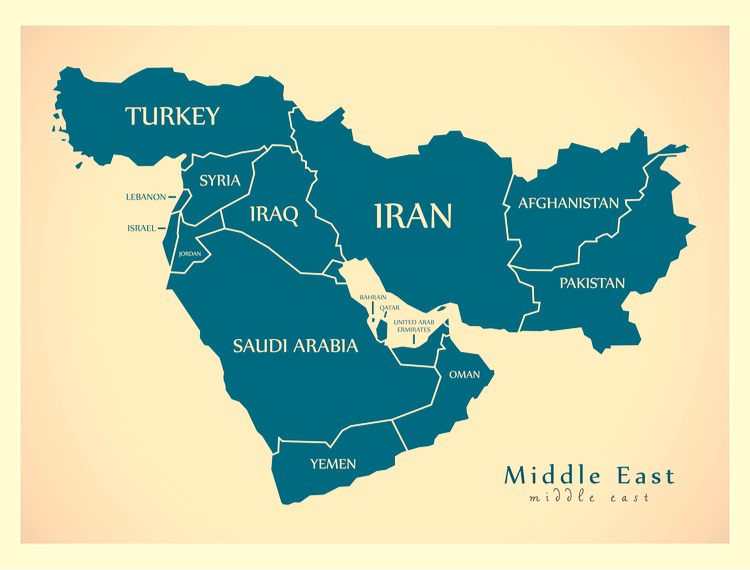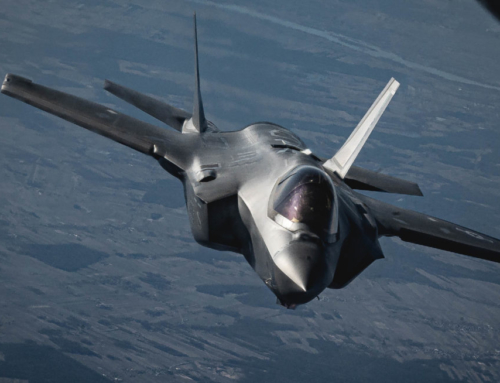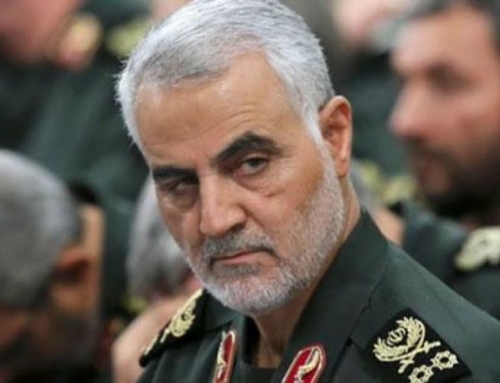
Royalty-free stock vector ID: 671941873
Iran has come to the forefront of political and military discourse in the last few weeks, and lost in the shuffle of hyperbolic political statements is exactly what a war with Iran would mean and what would be required from the American public and the military. Too often – as I have learned from personal experience – elected officials promise a quick and easy war when it most decidedly will not be either quick or easy.
Make no mistake, Iran is a malignant actor on the world stage and I fully believe it was both responsible for the planting of bombs on two cargo ships in the Hormuz strait and shooting down our drone in international airspace, luring the US closer to a war. To that end, I thought it would be instructive to show just how different this war would be from any of the near-term conflicts the U.S. has conducted. I heard Senator Tom Cotton say that it would be over in two strikes, causing my jaw to literally fall open. I’m not sure what Kool Aid he was drinking, but I was shocked to see a former army soldier, who participated in both the Iraq and Afghanistan conflicts, reduce a war in Iran to a platitude. Quite simply, his rosy prediction is woefully inadequate.
Beyond the politics, here are three differences and one similarity in an Iran war vs. our past recent wars:
Number One: Iran is a homogenous country. They are Persian, and devoutly proud of that fact. In both Iraq and Afghanistan, at the most we had ambivalence to the power structure, and at the worst, outright hatred. Iraq was a predominately Shia country ruled by an iron fist from a Sunni minority under Saddam Hussein. Thrown on top of that was a Kurdish population who had been literally gassed in an attempt at genocide. Despite all those fractures, we saw how Iraq played out. None of that will come into play in Iran. They will rally around the Iranian flag like there is no tomorrow, using the entire country to fight our advance. Anyone who says there is some subset of the population who would welcome our invasion has not studied this problem set. Yes, they have had protests, like the Green Revolution, but that doesn’t mean they want a foreign country to invade. While many in the country despise the mullahs, that doesn’t translate into open arms for the United States to conduct regime change. To put it in plain language, we had the “pussy hat” protests when Trump was inaugurated. Do you believe that all of those women would cheer on a North Korean invasion a la “Red Dawn”? (Just go with it) No. As much as they hate Trump, they wouldn’t welcome a North Korean takeover to get rid of him. They wouldn’t, because at the end of the day, they’re American more than they’re a political party, and it’s the same with Iran. Nobody is going to welcome us in this fight.
Number Two: This would be the first war where cyber would play a significant role. Against the Taliban it was a non-starter. They didn’t want anyone to read, much less work a computer. What about Iraq? Saddam would have liked to use it, but it was in the early days of the internet and he hadn’t built the groundwork. Iran has. We’ve already seen tit-for-tat cyber attacks from both sides. If we were to invade Iran, and regime change were on the line for the ruling class, the gloves will come off, and cyber will become a whole new front. The U.S. should expect everything from gas station outages to complete power failures to hospital ransomware attacks to corrupted Wallstreet banking transactions. Iran has learned a great deal about cyber since our own attack on them using the STUXNET virus, and has dedicated significant resources to developing a reciprocal capability. If we go to war with Iran, expect cyber to be unleashed in a wholesale manner for the first time in modern warfare.
Number Three: This will be a multi-front war. While both Iraq and Afghanistan had hints of a greater theater—from Syrian rat lines for foreign fighters entering Iraq to Taliban/Al Qaeda fighters hiding out in the FATA frontier lands of Pakistan—neither of those governments could count on any allies to help them in their fight, nor could they project force outside of their own borders.
The Taliban is basically a cult, and everyone in the Middle East hated Saddam Hussein. That is not true with Iran. It has a devoted base that stretches from South America to the Gaza Strip. We have arrested multiple Hezbollah “sleeper cells” in the United States, and the IRGC Qods force controls Hamas in Palestine, Hezbollah in Lebanon, the Houthis in Yemen, and almost all of the Popular Mobilization Forces in Iraq. Asserting that the U.S. could attack Iran in isolation – destroying it in two strikes according to Senator Cotton – is delusional. While I don’t believe Iran will unleash worldwide mischief based on a limited U.S. attack, make no mistake, if it feels its regime is threatened – and thus they have nothing left to lose – it most certainly will retaliate.
Besides the United States, its two biggest opponents – and the two cheering on a U.S. intervention – are the Kingdom of Saudi Arabia and Israel. Iran would attack both countries on two separate fronts for each. For KSA, Iran will unleash the Houthis in Yemen, encroaching inside Saudi Arabia proper from its southern border and tying down its forces to protect a southern flank. At the same time, it’ll instigate a destabilizing effort in Bahrain – another Sunni controlled country with a Shia majority. KSA has already invaded that country once to ensure the Sunnis remained in control, and it doesn’t require a crystal ball to see that Iran will leverage that unrest again. And, by the way, Bahrain is the home of our own Fifth Fleet, a tempting target
In Israel it’s easier. Iran will use Hezbollah in Syria and Lebanon to the north, and Hamas in the west from the Gaza Strip, to pin down the Israeli Defense Forces and force them to focus on their own survival versus helping us against Iran. At the same time, Iran will cause havoc with shipping in the Hormuz Straight, to inflict maximum pain on our European allies to pressure us to quit fighting.
U.S. troops in the region would provide another front, which Iran will attack. Without belaboring the point, while the US seeks to force its will on Iran, our forces will be attacked in Iraq through the PMF militias owned by Iran, which will give us a choice: Either start another war there, or simply leave Iraq, giving Iran full influence. We won’t want to do the former, but we can’t do the latter because we will need the bases in Iraq to conduct a campaign against Iran. This would lead to fighting in two different theaters against two different opponents.
Expect Iran to also open an “eastern front” inside Afghanistan when we try to use that country as a lily pad for force projection, sabotaging our fragile quest for a peace deal in that country and forcing us to use three-to-one manpower simply to protect our bases. Worst case, when the Iranian regime feels truly threatened, they’ll conduct overt attacks in our own heartland. Imagine three suicide bombers in three different states setting themselves off at a middle school, slaughtering eight year olds. The panic would be unprecedented – and all of the above would be without overt Iranian fingerprints. Neither Iraq nor Afghanistan had that capability, but make no mistake – Iran does. The bottom line is the United States has had a monopoly on violence for decades, but we haven’t attempted a kinetic operation since World War II where the opponent has multiple options to counter us.
Finally, the one similarity for both Iran and our other recent wars: At the end of the day, we would prevail in a conflict with the theocratic regime. It might be costly, but despite all of its asymmetric advantages, Iran would fall to our military might. When that occurs, we’ll be back where we were in 2002 in Afghanistan and 2004 in Iraq. Namely, what do we do now? Assuming we can bomb Iran into submission and then leave will not give us the solution we are attempting to accomplish. As the failed policy in Libya has starkly shown, getting rid of a regime is only half of the equation. The other half is what comes after, and this is where we’re really in a quandary. We have absolutely no capacity to install a new government that is more in line with our goals, and absolutely no allies who could help. There isn’t a Thomas Jefferson waiting in the wings to take the reins and start a democracy. Who’s going to do it? KSA? Israel? No, we’ll end up with the IRGC hiding in the population. If we’ve learned anything from our recent conflicts it’s precisely that we’re really good at breaking things, but challenged when rebuilding. But as I said about Libya in multiple blogs while that fiasco was occurring, that is precisely what will need to occur. Libya is now a terrorist mecca, where the armories were looted, which caused the downward spiral of Mali and directly led to the deaths of four US SOF in Niger. If we aren’t thinking about an endgame in Iran, we’ll get the same result.
In the end, bravado-laden comments from our elected leaders may play well on twitter, but somebody is going to have to pick up a rifle and execute, and before that happens, we should make a clear-eyed assessment of what we’re facing. We didn’t do that in Iraq or Libya, and the world is worse off because of it. If attacking Iran is necessary, then by all means, let’s do it, but let’s be honest with the American people about what that would entail. We should at least use our historical knowledge to avoid the myopia of the past, and not lead with rosy predictions of two strikes and we’re done.










As always, thank you for your informed assessment. Appreciate your voice. Sir.
Very well-written. Thanks Brad!
It is disheartening (to put it mildly) when politicians aren’t forthcoming with the REAL costs and consequences of war. I appreciate your taking the time to help educate and spread the scary truths that this conflict would bring.
Praying for reasonable and peaceful outcomes.
Great analysis Brad. Mr. Cotten is poorly informed. I think some tough days are ahead. They want blood and may get it. I worry for my fellow Americans.
How prepared is the US for the kind of cyber attacks you speak of in your article? Can we defend against it? And if they are that good at cyber attacks, doesn’t that make our military at risk for the same?
Truthfully, the hardest part about defending against cyber attacks – as Podesta learned the hard way – is that it’s up to the individual. We can protect ourselves from brute force attempts through our own cyber defenses, but we can’t from that one idiot on a network who clicks on an embedded link in an email. The military is well protected from such things because all of the email communication is outside the cyber systems that it could affect, but that’s not the same for wall street, hospitals, the power grid, etc.
Well balanced analysis, thank you Brad.
The later comment about Iran unleashing suicide bombers in US against soft targets – not that credible tho. Shia doctrine does not condone suicide attacks in the same way the takfiri end of the Sunni spectrum does. Yes there are examples like Beirut in 83 – but I’ve been told by Shia hardliners that it was ‘permissible as it was viewed as an act of war’. High ranking conservative Shia clerics have actually issued fatwas against suicide bombing.
So sure Iran would likely attempt to hit US homeland via assymetric means if the regime got desperate, but unlikely to involve suicide bombers against soft targets.
It’s absolutely credible, and you make the mistake of looking at the problem through a religious lens. A) you prove my point with your comment that it is “permissible as it was viewed as an act of war”. which is exactly what I’m talking about. It WILL be an act of war. The problem set I’m referring to is war, with the regime’s survival at stake. Lebanon didn’t rise to that level of risk, but they still sanctioned it. B) The second intifada in Israel was conducted by Hamas, with a veritable wave of suicide bombers. All of them were funded by Iran. No cleric stopped them from conducting the attacks based on some religious fatwa. Saying a cleric issued a fatwa against suicide bombings equates to it won’t happen here is the exact shallow thinking Tom Cotton is using. But you’re absolutely right about the fatwa. I just don’t think that will have any teeth when the difference is death of the regime or following the fatwa.
One oversight, IMHO. Politics has never been the cause of America’s post WW2 wars. These wars have always been driven and sustained by the industrial military complex, as predicted by Eisenhower. Regardless of political outcomes, these wars are very, very good for business — the arms business. For all I know, they’re supplying both sides.
Brad, great insight and I believe your assessment is spot on! If Iran initiates another small attack, could you see another scenario where we trade small attacks on each other until Iran comes to the conclusion that an all out war with us would catastrophic to their country, and backs off? The fact that Trump used restraint over the drone shoot down leads me to believe that not only does Iran know what’s at stake, but so does the US. I do think any loss of US lives by an Iranian attack would change the game. Curious your thoughts. Thanks again for your great analysis!
I most definitely think we can get in a tit-for-tat strike package here, and I do believe that a loss of US lives would change the game, but not necessarily in the way you envision. This is actually a whole different blog, but Iran knows they cannot compete with us militarily. If it goes to all out war, they will lose, so they are going to fight us asymmetrically, precisely through US willpower by leveraging US casualties. Iran can take the punishment of a bombing campaign (they fought Iraq for 8 years and lost over 300,000 people), so what they will want to do is drag out a conflict, trying to be perceived as the underdog, while killing US personnel without their direct hands on it. We kill 300 Iranians with US Airpower and they kill 3 Americans through an indirect fire mission against Al Asad airbase in Iraq. Rinse and repeat throughout the rest of the middle east and eventually I believe we will lose the political will to continue. Iran will be fighting for survival with a true existential threat, and their people will react accordingly. We’re just bombing another country in the Middle East, and our population will grow tired with the operation if the administration can’t demonstrate a serious threat to US interests. As we’ve seen in the past with Iraq, Vietnam, Afghanistan and Somalia, we’ll lose interest before they do, because for them to quit means the loss of existence. For us, it just means we don’t hear about the deaths on the news anymore.
What’s this? An iota of common sense? Is that allowed anymore? That said do you think that Iran has the capacity right now to launch an EMP strike against her enemies?
Ha! Thanks. Glad you see the common sense. As for the EMP question, I have to say, what is up with all the questions about EMP? I get them on FB, Twitter, and now here. No, I don’t think Iran has an EMP capability, but apparently there’s a stream of thought that believes that A) Israel has it, B) The United States has it, and now C) that Iran has it. No, none of us have it (outside of a thermonuclear airburst explosion). There is no such thing as a non-nuclear wide spread EMP weapon. Well, there is, but it’s in my books, and it’s a surgical thing being worked on with DARPA. It’ll take out the computer of a car, but it won’t take out a city.